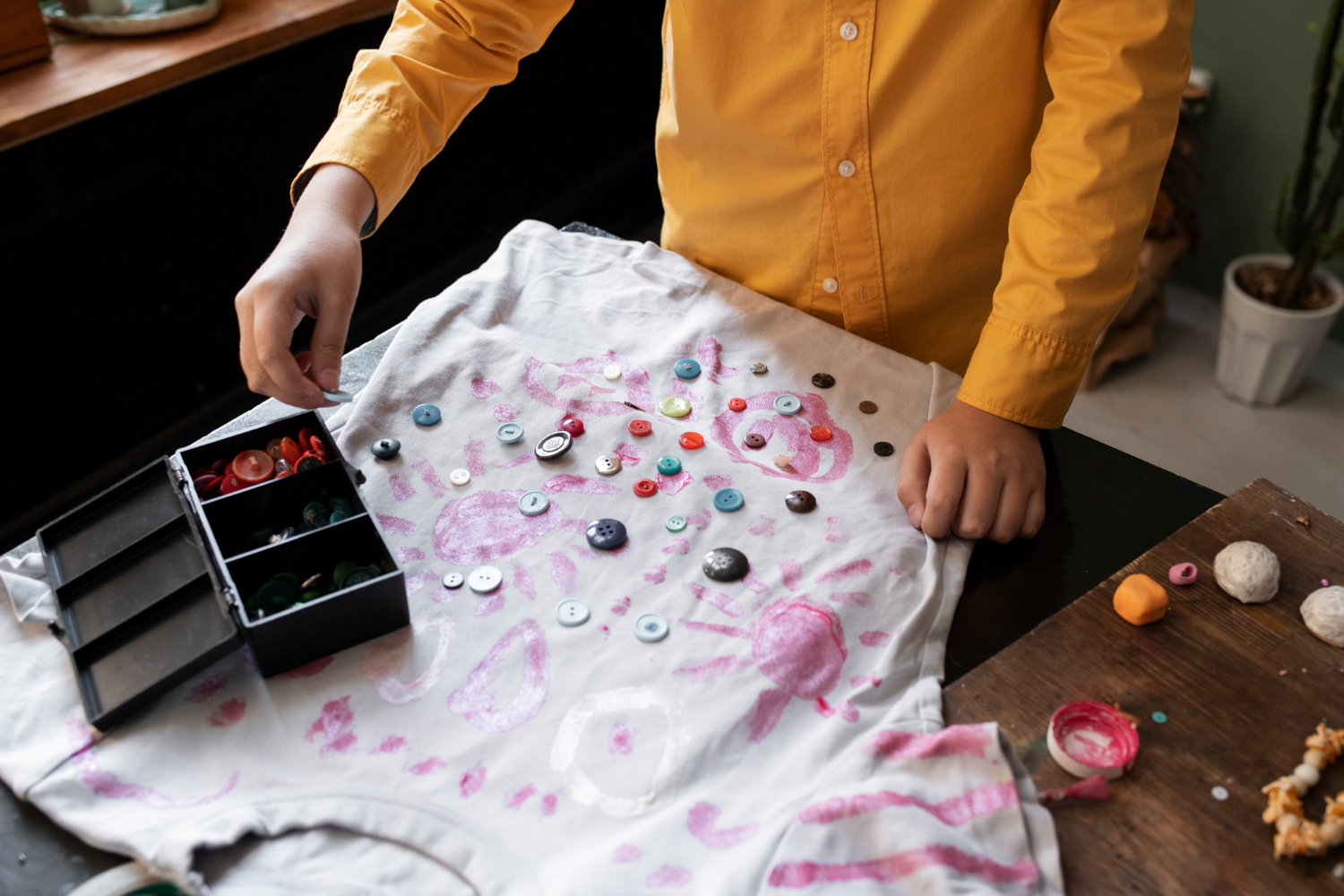Introduction
How to get wood stain out of clothes? Woodworking can be a rewarding hobby, but it often comes with an unintended consequence: wood stain on your clothes. Whether you’re a seasoned carpenter or a DIY enthusiast, you’ve likely encountered this frustrating issue at some point. The good news is that you don’t have to say goodbye to your favorite garments just because they’re stained with wood finish. In this comprehensive guide, we’ll explore various methods of how to get wood stain out of clothes effectively. Say goodbye to those stubborn stains and keep your wardrobe looking its best.
Understanding Wood Stains
Before we delve into stain removal techniques, it’s essential to understand the types of wood stains:
Oil-Based Stains
How to get wood stain out of clothes? Oil-based wood stains are popular for their durability and rich color. However, they can be particularly challenging to remove from fabric due to their adhesive nature. Here’s how you can tackle them:
Method 1: Dishwashing Soap and Rubbing Alcohol
A strong solution is necessary for oil-based stains. Using a combination of dishwashing soap and rubbing alcohol is one efficient technique. Take these actions:
- Blot the Stain: To get rid of the extra stain, gently blot the discolored area.
- Mix the Solution: Combine a few drops of rubbing alcohol with dishwashing soap.
- Apply the Solution: Make sure the stain is completely covered with the solution before applying it.
- Scrub Gently: Apply gentle pressure to the area with a soft brush or cloth.
- Rinse and Launder: Thoroughly rinse the item and wash as usual.
Method 2: Acetone
Acetone can be effective in breaking down oil-based stains. Here’s what to do:
- Test in an Inconspicuous Area: Before applying acetone to the stain, test it in an inconspicuous area of the fabric to ensure it won’t cause damage.
- Blot the Stain: Gently blot the stained area with a cloth to remove excess stain.
- Apply Acetone: Dampen a cloth with acetone and gently blot the stain. Avoid rubbing too hard, as this can damage the fabric.
- Rinse and Launder: Rinse the garment thoroughly and launder as usual.
Water-Based Stains
Water-based stains are easier to clean compared to oil-based ones, as they contain fewer chemicals. Still, they can pose a stain-removal challenge if not treated promptly. Here are some methods to address them:
Method 1: White Vinegar
Water-based stains can often be removed with white vinegar:
- Blot the Stain: Begin by blotting the stained area to remove excess stain.
- Apply White Vinegar: Dab white vinegar onto the stain using a cloth or sponge.
- Rinse and Launder: Rinse the garment thoroughly and launder as usual.
Method 2: Hydrogen Peroxide and Dish Soap
Another effective method involves hydrogen peroxide and dish soap:
- Mix the Solution: Combine hydrogen peroxide and dish soap.
- Apply to Stain: Apply the solution to the stain, ensuring it’s fully covered.
- Rinse and Launder: Rinse the garment thoroughly and launder as usual.
Additional Stain Removal Methods
Method 3: Glycerin and Dishwashing Soap
Glycerin, a common household item, can also help in removing wood stains:
- Blot the Stain: Gently blot the stained area with a cloth to remove any excess stain.
- Mix the Solution: Create a mixture of glycerin and dishwashing soap. Combine equal parts of each to form a paste.
- Apply the Paste: Apply the glycerin and dishwashing soap paste to the stain.
- Work into the Stain: Use a soft brush or cloth to gently work the paste into the stained area.
- Rinse and Launder: Rinse the garment thoroughly and launder as usual.
Method 4: Cornstarch and Water
For a gentle alternative, you can use cornstarch and water to remove wood stain:
- Create a Paste: Mix cornstarch with water to form a thick paste.
- Apply the Paste: Apply the cornstarch paste to the stained area, ensuring it covers the entire stain.
- Let It Dry: Allow the paste to dry completely on the stain. This can take several hours.
- Brush Away the Paste: Once the paste is dry, gently brush it off.
- Rinse and Launder: Rinse the garment and launder it as usual.
Pre-Treatment Steps
Before you dive into stain removal, there are some critical pre-treatment steps you should follow:
Act Quickly
Quick action is essential for stain removal success. The stain is tougher to get rid of the longer it remains. Why moving swiftly is crucial is explained here:
Immediate Stain Penetration: The speed with which wood stains penetrate fabric fibers is well known. It begins to form a bind with the fibers of your clothing as soon as it touches them. A permanent discoloration is more likely to be avoided the quicker you act.
Preventing Set-In Stains: It is much more difficult to remove a stain after it has “set in” or dried. Once a stain has been established, complete removal frequently necessitates further work and several treatments.
Identify the Stain
Determine whether the stain is oil- or water-based by carefully inspecting it. This will assist you in selecting the best stain-removal technique. Here’s how to determine what kind of stain it is:
Color and Texture: Oil-based stains tend to be deeper in color and may have an oily or greasy texture. Water-based stains, on the other hand, have a paler hue and have a more paint- or dye-like consistency.
Smell Test: Gently sniff the stained area (if you can). Oil-based stains may have a faint, oily odor, while water-based stains are often odorless.
Chemical Label: If you have information about the wood finish used, check the product label. It may indicate whether it’s oil-based or water-based.
Remove Excess Stain
Before applying any stain removal solution, gently blot or scrape off any excess stain with a dull knife or a cloth. This prevents the stain from spreading further into the fabric.
Additional Tips
To enhance your wood stain removal process, consider the following tips:
Patience is Key
Removing stains may take some patience, especially if they are old or difficult to remove. If you don’t get results right away, don’t give up. If required, repeat the procedure.
Avoid Heat
Do not use hot water or high-heat settings when laundering stained clothing, as heat can set the stain permanently. Stick to cold or lukewarm water for best results.
Seek Professional Help
If the stain persists or if it’s on a valuable or delicate item, consider seeking professional dry cleaning services for expert assistance.
Pros and Cons
Pros:
- The methods provided are cost-effective and use common household items.
- They are suitable for treating a wide range of wood stain types.
- Acting promptly can lead to successful stain removal.
Cons:
- Some stains may be particularly stubborn and may require multiple attempts.
- The effectiveness of the methods may vary depending on the fabric type.
- Using the wrong stain removal method can worsen the stain or damage the fabric.
Conclusion – How to Get Wood Stain Out of Clothes
How to get wood stain out of clothes. Wood stain on your clothes is no longer a cause for despair. By acting quickly and employing the right stain removal methods, you can salvage your stained garments and continue to look your best. Remember, the key is to match the stain removal technique to the type of wood stain, whether it’s oil-based or water-based.
Now you have the tools to rescue your clothes from wood stain mishaps. Don’t let these stains dictate your wardrobe choices; take action and wear your favorite outfits with confidence.
Frequently Asked Questions
Q: Can I use bleach to remove wood stains from clothes?
A: No, bleach is not advised since it may interact with the chemicals in the wood stain and worsen the condition when used to remove wood stains off clothing.
Q: What if the wood stain has already dried on my clothes?
A: It is harder to remove a stain once it has dried. You can still try the techniques described in this article, although repeating the procedure numerous times will yield better results.
Q: Will these methods work for all types of fabric?
A: Depending on the fabric, these techniques may or may not be effective. Before using the stain removal solution on the stain, always test it on a tiny, discrete area of the fabric.
Q: Can I use a commercial stain remover for wood stains?
A: A commercial stain remover made for wood stains can be used, yes. For optimum results, strictly follow the product’s directions.
Q: What if the wood stain is on delicate or dry-clean-only fabrics?
A: For delicate or dry-clean-only fabrics, it’s best to consult a professional dry cleaner to ensure the stain is removed without damaging the garment.
Review Extra Pages: How to Get Baby Poop Out of Clothes



